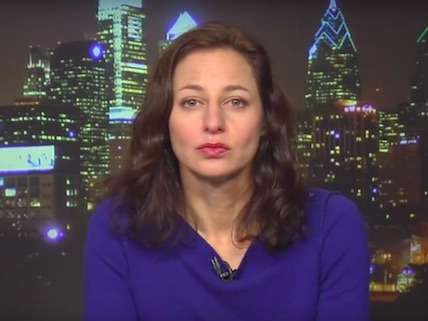UVA Lawsuit: Rolling Stone Believed Jackie Until the Bitter End, New Documents Show
Jackie's obsession with Law and Order: SVU, Sabrina Rubin Erdely's search for missing scars, and more.


It was blind faith in her single source—a faith bordering on zealotry—that doomed Rolling Stone contributing editor Sabrina Rubin Erdely to write a false story about gang rape at the University of Virginia.
New documents submitted in court Friday as part of UVA Dean Nicole Eramo's lawsuit against the magazine make clear that Erdely was given plenty of reason to distrust Jackie. Instead, Erdely rationalized Jackie's repeated failure to produce corroborating witnesses by surmising that these were the actions of a true victim and survivor of sexual assault.
The documents released Friday contain hundreds of pages of Erdely's notes, and transcriptions of her interviews with more than a dozen key players, including Jackie, friend Alex Pinkleton, and UVA anti-rape activist (and White House advisor) Emily Renda. Here are five of the most interesting things they reveal about the debacle.
1) Jackie Really Did Seem Traumatized
To be absolutely clear, Jackie's retelling of her subsequent trauma was convincing (even if the story itself was hard to believe). Jackie painted a compelling portrait of a student who had suffered harrowing, ongoing emotional abuse. She described being unable to get out of bed for weeks, failing classes, suffering panic attacks whenever she encountered members of the Phi Kappa Psi fraternity, having suicidal thoughts, and eventually seeking support and counselling.
Anecdotal evidence suggested that this trauma was genuine. After interviewing Jackie, her then boyfriend, and Pinkleton, Erdely accompanied them to the Phi Kappa Psi house to inspect the scene of the crime. As they drew near the house, Jackie suffered a breakdown, burst into tears, and ran away. Erdely witnessed this episode herself, and took it as one of many indications of Jackie's credibility.
Jackie wasn't always consistent, but the inconsistencies didn't seem compelling enough to dent Erdely's faith. In fact, these inconsistencies largely confirmed to Erdely that Jackie was telling the truth, since Erdely believed that such behavior was typical of survivors of sexual assault. It's no mystery why Erdely had come to hold this view: she consistently relied on the testimony of biased sexual assault experts, including Wendy Murphy and David Lisak.
2) Failing to Interview Jackie's Mom and Friends Was the Mistake
Erdely made a significant misstep when it came to second-hand sourcing, and it's one that is well-documented in her notes. Indeed, if this error had been addressed properly before publication, the entire story would likely have unraveled. Instead of seeking comment from the most relevant witnesses—Jackie's mother, her friend Ryan Duffin, and alleged perpetrator Haven Monahan—Erdely accepted Jackie's contention that her mother and Ryan wouldn't consent to be interviewed. And she didn't obtain the name "Haven Monahan" until the story had already gone to print.
Erdely interviewed many friends of Jackie's who could testify to her emotional state in the weeks following the attack. But Duffin—along with two other friends, Kathryn Hendley and Alex Stock—encountered Jackie immediately after the rape, and could have given key evidence about her physical state. Her mother could have confirmed the existence of Jackie's bloodied dress. To her credit, Erdely repeatedly asked to speak with these people, but Jackie stonewalled her. She also refused to give Erdely the last names of Duffin, Hendley, and Stock, which prevented the reporter from interviewing them herself.
Erdely also insisted that Jackie provide the name of her attacker so that she could reach him for comment. Jackie adamantly refused, and after consulting with her editors, Erdely decided that comment wasn't necessary. But here's the thing—even if she wasn't going to contact him, Erdely should still have pressed Jackie for the name, if only to confirm his existence. A Google search would have revealed that no such person existed: indeed, this is exactly what happened, once Jackie gave up the name after publication of the article.
3) Jackie's Obsession with Law and Order: SVU Played a Role
Did Jackie base her story on an episode of Law and Order: SVU? It seems plausible.
According to the documents, Jackie told Erdely she was obsessed with the show—she recalled, off the top of her head, that main character Elliot Stabler departed the show after its 12th season.
Jackie told Erdely that her assault called to mind a specific episode in which a female college student is gang raped by fraternity members. No one believes the girl, and she eventually commits suicide.
Jackie also said that some time after her assault, she re-watched the episode with her father. This prompted her to tell him, for the first time, that what happened to the girl on the show had also happened to her.
4) Jackie's Scars Were a Tricky Issue
Jackie described being knocked into a table and pressed against broken glass as part of her ordeal. But it's not clear whether there was any evidence of scarring on her body, even though Erdely looked for marks.
The reporter wrote in her notes that she couldn't see any scars on Jackie's arms, and Jackie's boyfriend said that he had never noticed any on her back. Jackie said that her mother believed they had faded over time.
One former friend of Jackie's told Erdely that she had noticed scratches, but attributed those to Jackie's cat, and possibly, to self-harm.
5) 'Our Worst Nightmare': Erdely's Dramatic Realization that Jackie Was Lying Happened All at Once
Journalist Richard Bradley was the first to express skepticism of Erdely's reporting. He did so on November 24. I followed with my own article on December 1, which quoted Bradley.
For several days, our misgivings didn't phase Erdely, even though many other news outlets had repeated them. Erdely stood by her story until the night of December 4. Up until that point, she was planning to publish a follow-up article expressing complete confidence in Jackie.
What changed? Very late that evening, Erdely had a conversation with Jackie in which she asked for assistance in identifying Haven Monahan. Jackie was evasive, and eventually hung up the phone. Erdely then called Pinkleton, who had been trying to track down Haven Monahan herself. They agreed that the story no longer added up. "Hardly anything she said to me or said to you over the past year is working out at all," said Pinkleton.
Erdely then sent an email to her editors with the subject line, "Our Worst Nightmare." In the email, she wrote, "We have to issue a retraction."
In a statement to the court, Erdely apologized for her missteps.
"I cannot stress enough that at the time the Article was published, and until the early morning of December 5, I firmly believed that everything in it was true. It was never my intention to cause harm, and I feel nothing but sorrow and regret over the entire experience. If I had had any doubts prior to publication about the integrity of this story, or about Jackie's credibility as a source, I would not have published it."
(Thanks to KC Johnson for providing the documents. Read his comments here.)


Show Comments (288)